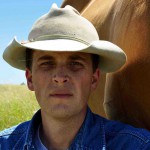This discussion is a sidebar to an in-depth personality profile of author John R. Erickson, creator of the “Hank the Cowdog” series of books and audios. Click here to be taken to the profile. If you have arrived here from the profile, or are following up on a search query, please read on:
George Clay:
On the college student seminars held at the Ericksons’ ranch:
“For the second year in a row he held this writing camp. What the college kids want to know is, ‘What is the ABC for being a good writer?’ They want a one-two-three. An outline. And John will just have a smile on his face, but he rarely says anything more than ‘You’ve got to practice your craft. If you are a surgeon you do surgery all the time. If you are a writer, you’ve got to write. And if you write [constantly], you are going to get better at it.’”

Clay speaks of Erickson as being “very other-oriented” (as in focused on others).
“I call him a culture warrior. He cares about our culture and he doesn’t just sit around and complain about how bad things are. He is out making a difference.”
Jeryl Hoover:

On Erickson as a person:
“There is a lot of depth to him. Here is a guy who writes humorous stories about a dog on a ranch, and yet the interesting thing is, behind all of that is a lot of depth.
“I used to do Hank the Cowdog programs in schools with him, and I can tell you that there is a lot of affection for him and his books out there. My kids are grown now but I hope some day to have grandchildren, and it is nice to know you can turn them over to an author like John Erickson and know what they are going to read will be good wholesome stuff with good characters.”
On Story Craft:
“It’s personal story and [an account of] some of the trials he has been through with the Hank product. Here is a guy who would not compromise in any way. If he had sold out, he would have paid a price. He would have been a richer person financially. But not in his heart. And he knew that. And it is great to come across a guy with that kind of self awareness.”
Britt Hancock:
The Hank stories, Hancock says, exhibit a strong moral stand. “It’s good, clean humor and it has tremendous value for us as parents because there is so much junk out there.”
Then comes the telling part.

“I didn’t know he was a believer but I just sorta figured it out because of the content and the way that he has. You can see it from that moral base of his and the way it is woven into his stories. I think the further you go into them, the more great lessons there are woven into them. And it’s done in a humorous way, a way that, for me, is reminiscent of the values I knew growing up in a rural setting. That platform is being lost more and more, partly from urbanization.
“I can guarantee that when it comes to people who have never that kind of connection to the ground, never had any blisters from that kind of work, there is a lot about reality that they don’t understand.
“We have this pushbutton society. In a pushbutton world, people understand life theoretically but they don’t understand reality—the things of substance—the real assets of who we are as a people, of who we are as a nation. It isn’t that people don’t understand what manual labor is all about. But there is a marked difference between the way people think who know how to do things with their hands and have sort of worked through the struggle of producing something. And I can guarantee you that John R. Erickson has had many blisters on his hands and on his feet.
“Rural people understand the things that underpin everything that we stand on top of, and the foundation comes from the dirt. Even in building a house, the most important part is the foundation. You don’t start on the roof. I work with subsistence farmers. They understand.”
Hancock has read Story Craft. What did he think of it?
“I thought that it was absolutely tremendous. You can see that it takes a very smart man with a sharp mind to write the kinds of stories he does in the Hank books, but apart from that, in Story Craft, you can see that not only is his intelligence level extremely high, but his concern for the moral state of the country is strong as well. To me, it [Story Craft] is a reflection of who we are—and the values that we hold, even theologically. Because I have a great concern for the church. I feel we have deteriorated so many things to doctrine. Information. And what we need is to live the values that we teach.
“The thing that really resonated with me, outside of the moral message of Story Craft, is his positive belief in skillful story craft. Teaching passes information, but a story is how that information is applicable or transferrable in a real-world way.
“Somebody’s testimony is in essence their story, and so Story Craft is to me a call, a clarion call, stating that it is people’s lives, people’s stories, both fictional and non-fictional, that lend so much power to the fabric of who we are.
“There are thousands of pages of theologies. But there are not thousands of stories of people’s lives and how they have become what the theology is trying to accomplish. Paul said, ‘You are my living epistles,’ and to me that is the message of the church. To write ‘living epistles.’ I think our need, from a literary standpoint, for skilled [Christian] storytellers is unprecedented.
“In the church, in religious circles, there aren’t that many who are good at it [telling stories]. Most of the books they write are ‘teaching’ books or they are autobiographical in nature. At least among the current author pool. And so much of that material is rather dry.
“And so I think it [storytelling] is the most powerful means of communication. Jesus was a great storyteller. His parables were what he used to illustrate the deep meanings of God. And a parable is just a story with a point to it. It is the main medium Jesus used to communicate the deep meaning of the kingdom.
“Actually, when I preach, about 50 percent of it is storytelling… and it is the thing that causes people to relate the most. And it is the thing that brings these complex heaven-hell ideas [into focus] and makes people understand that they are attainable. It creates the idea of possibility within people.”
Nathan Dahlstrom

On knowing John:
“I met John I guess five years ago. My dad, being superintendent at Lubbock (Texas) Christian School, had hired John to do their fundraising dinner. I met John at that. We really hit it off. I had an artistic interest in what he was doing and I have cowboyed professionally off and on when not sitting at a desk. He [John] has taken me under his wing.” [Dahlstrom is Unit Director at the school, and he is in the process of opening a boys’ ranch in Missouri, for which he will serve as Executive Director.]
“There are people who are famous to the masses and yet the people who meet them are disappointed with them. John, when someone gets to meet him, is someone who is likeable. He is still ‘just a guy.’ That’s who John Erickson is. He has stayed honest to his roots.”
On the message of Story Craft:
“A big part of the ‘other side’ [the secular, non-believing public], as soon as they hear our Christian language [as writers or artists], decide that that cheapens our work. It turns them off. But look at To Kill a Mockingbird. That book, though it didn’t discuss Christianity, was profoundly Christian. It’s full of honesty. The character Atticus Finch is a gentleman. He stands up for the idea that racism is wrong. It is about injustice. It is full of inherently Christian worldviews. You can reach people without an altar call.”
This is what is meant by “creating the culture,” one of the themes of Story Craft, Dahlstrom said.
To return to your place in the main text, simply click the “back” button (or arrow) on your browser.
To access (from its beginning) the profile of “Hank the Cowdog” creator John R. Erickson, go here.
